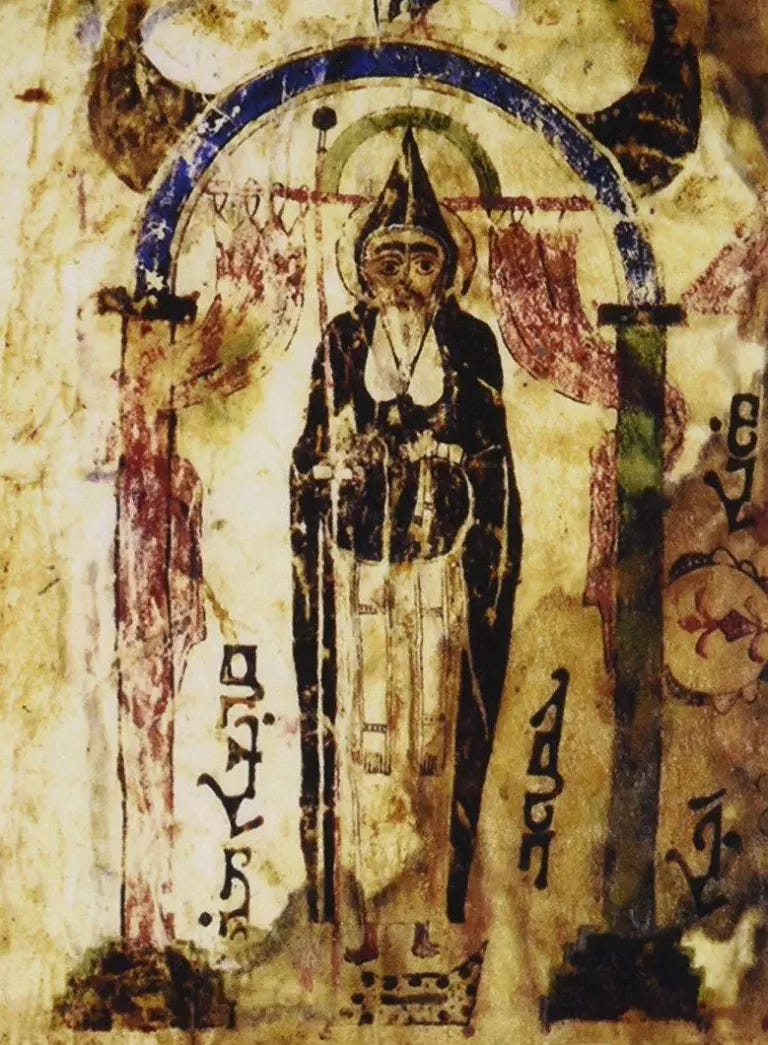In under twelve hours, it will be 2025 here in Northern Arizona. It is time to reflect on the old year and look forward to the next.
Just a little while ago, a Syriac Orthodox Facebook friend posted a German-language meme on my page to wish me a happy New Year. It said, “A good slide into a hopefully better year 2025.” To explain culturally, Germans wish each other “a good slide” into the New Year, meaning they hope we get there safely.
I will admit that this sentiment, while well-intentioned, bothered me.
Yes, the year 2024 brought many challenges for human beings, healthwise, personally, job-wise, politically, or worse yet, war or conflict, or any number of challenges. And yet, did it not also bring many moments of joy? Engagements, weddings, children born, anniversaries, birthdays, and, in my case, a PhD graduation.
Much of what is happening in our lives is wonderful when we see it through the lens of God’s goodness toward us. Did He ever leave us or forsake us? In my (soon-to-be, March 27th, to be specific ;-) ) sixty-four years of life, I have never experienced God forsaking me. Every time I thought that this was not good, this was the end of life as I knew it, God provided the next step. He was faithful time and time again.
Sometimes, it may help to remind ourselves just how precious human beings are in God's sight. Let this sink in: how much detail went into the creation of the human race? In his homily on the fashioning of creation, St. Jacob of Sarug (who lives ca. A. D. 452–521) wrote about how marvelously the Lord crafted man and woman:
He spoke and He made, just as He said, an image of the Father, a likeness of the Son, the Messiah, in a corporeal depiction.
From the elements of which the world exists He fashioned it, that it might be easy for him to guide his fellow creatures properly.
A grain of dirt, a drop of water, and fire and spirit, his soul within him and a breath for [his] anointing.
(God) fashioned, marked, adorned, painted, constructed, and modeled [Adam], and when he was completed He blew into him a life-giving spirit.
He made feet for him that they might serve him like a chariot, that he might tread out long distances by his own footsteps.
He made hands for him that they might fill for him all his needs, and ten fingers so that he might apply them to every sort of good He made eyes for him to be gates to the light for his entire body, by by which he might see all the beautiful things that are in creation.
He placed the eyes in the head just like brides, and upon them He fashioned beautiful eyelashes,
He hung over the front of the eyes, the gates, the eyelids, which open and close, and keep the eyes safe from harmful particlen.
He fashioned the eyebrows that they might serve as a signal, and function in the place of a word from time to time.
He made ears for him, vessels for sounds and melodies, so that through them all sorts of information might enter into his mind.
He made him a nose [with] nostrils to have control over smells, to test them and to recognize them for just what they are.
He made him a mouth that by it he might give glory to the Lord - his Lord, and to be the receptacle for the nourishment of his entire body.
He made for him a palate that it might examine various tastes, and that it might distinguish what is sweet from what is bitter.
He made a tongue, that two-faced member, that produces words, as well as lips that give utterance when they move.
He placed a word in his soul but in the heart thoughts, which are to impel him to the service of beautiful things He fashioned thoughts in the heart and cheerfulness in the diaphragm, rage in the liver, and He placed sadness in the spleen, laughter in the face, and weeping in his beautiful eyes, that his face might change between joys and sorrows.
The mind with a brain and mysteries hidden in the kidneys, teeth for eating and yet another (body part) for evacuation.
He adorned Adam both in his hidden and in his visible [features], in soul and in body, and he became a vessel full of beautiful things.
On top of his head He placed a thatch of hair like a crown, that it be made known to his creatures that he was the king.
He formed Eve and when He made her He united her to him, that when he sets her aside, nature might cry out that she is of his flesh.
He hid her in his body, and in that one body He created them that when she was revealed the world would perceive that they were from a single [body].
Adam is one, and the two that came into being are from that one; in one act of formation that One Who Forms fashioned them both.1
Even from these writings above, we can see clearly St. Jacob describes that we were created both for joy and for sorrow:
He placed a word in his soul but in the heart thoughts, which are to impel him to the service of beautiful things He fashioned thoughts in the heart and cheerfulness in the diaphragm, rage in the liver, and He placed sadness in the spleen, laughter in the face, and weeping in his beautiful eyes, that his face might change between joys and sorrows.2
We can expect to experience life experiences that can blow us this way or that way, yet in all of this, nothing is outside God's will. And nowhere in Scripture is there any indication that He will leave us without His oversight.
In the Old Testament, the Lord promises never to leave:
Be strong and bold; have no fear or dread of them, because it is the Lord your God who goes with you; he will not fail you or forsake you. (Deuteronomy 31:6, NRSVUE)
It is the Lord who goes before you. He will be with you; he will not fail you or forsake you. Do not fear or be dismayed. (Deuteronomy 31:8, NRSVUE)
In the New Testament, we see the same promise:
Keep your lives free from the love of money, and be content with what you have, for he himself has said, “I will never leave you or forsake you.” (Hebrews 13:5, NRSVUE)
St. John Chrysostom (who lived A. D. ca. 347-407) adds to this verse: “Let your conversation be without covetousness, he says. He did not say, Possess nothing, but, Let your conversation be without covetousness: that is, let it show forth the philosophical character of your mind.”
Just a thought here: maybe there is the secret to your happiness in 2025?!?! Let go of your desire for more, more, more! Focus instead on Christ!
St. Jacob of Sarug seems to agree:
He straightened you, set you upright, and directed your face towards heaven,
That you may see your place and consider how beautiful it is.
He directed your face towards your place, the original one, For this land that you stand on is not yours.
The form of your body cries out, that you are not earthly, You are from above, seek the things which are above and contemplate them.
You are a stranger and a foreigner in this place, Do not think about what is in it because it is not yours.
Death comes, making what is yours no longer yours, and, like a plunderer, [it] separates and removes you from your possessions.
If [one's] need passes over the day's measure, It is a burden, in this case, and does not permit you to climb above.
Do not gather for yourself the burden of the world and do not drown
Your soul because the great image of the Godhead is depicted in it.
You are that image of God, seek [therefore] what is above3
Reflecting on the year 2024, God was faithful in walking with me through the ups and downs of my life. He was faithful in the life of my family and friends. He was faithful in what happened in this world … even though we may not understand any of this fully until we see Him face to face one day.
Let us begin our year 2025, placing our full trust and hope in God's kindness and goodness! And let us not say that we hope for a better year ahead. Let us instead seek to be a part of Christ's goodness in the lives of those around us. And let us share His great love with those who do not know Him.
May the Lord bless you and keep you this coming year and always.
Jacob. 2021. Jacob of Sarug’s Homily on the Fashioning of Creation. . Translated by Edward G. Mathews. Piscataway, NJ: Gorgias Press LLC, 2245-2290, p. 306-12.
Ibid, 2275-2280, p. 310-12.
Jacob. 2022. Jacob of Sarug’s Homily on Paul’s Word to Seek What Is Above and on Outer Darkness. Edited by Dominique Sirgy. Piscataway, NJ, USA: Gorgias Press LLC, 55-65, p. 14.





